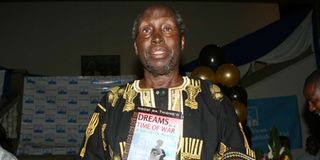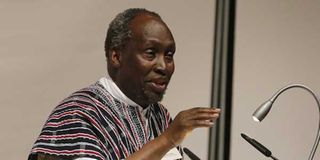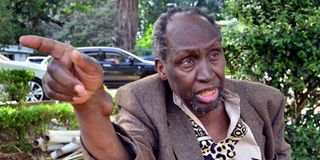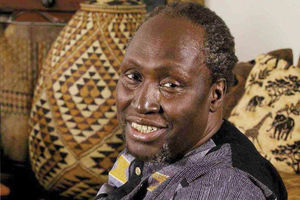
Prof Ngugi wa Thiong'o holds a copy of his autobiography titled 'Dreams in a Time of War, after it was launched on August 19, 2010 in Nairobi.
Literary icon Ngugi wa Thiong’o, who died on Wednesday, 28, 2025, appeared on the list of favourites for the Nobel Prize in Literature for nearly a decade.
The prestigious award, however, remained elusive for the Kenyan literary giant. From 2010 to 2022, the award was so near yet so far for Prof Ngugi even when he remained punters’ favourite for several years in a row.
In 2020, when he was again considered as a favourite for the award, the New York Times boldly acclaimed “Ngũgĩ, 82, has been tipped to win for a decade. But this year seems timely for the Kenyan writer whose work chimes with the global focus on black lives…”.
But it was not to be, with subsequent appearances on the list leaving his admirers, who have each year waited for him to be declared a Nobel laureate, heartbroken.
In 2022, the award was clinched by French author Annie Ernaux. The Nobel Prize in Literature 2021 was awarded to Zanzibari-born Abdulrazak Gurnah. Renowned author Chinua Achebe also did not win the award despite her works being among the most widely read in Africa and all over the world.
'The Nobel of the heart.'
The Nobel prizes have been awarded since 1901 and conferred on top achievers in different fields of Physics, Chemistry, Literature, Physiology or Medicine, Promotion of Peace and Economic Sciences.
In one of his widely quoted interviews on the elusive Nobel Prize, Prof Ngugi said he was more interested in "the Nobel of the heart.”
“When I go to a place, and I meet a person, and they tell me, ‘your novel or your story impacted my life,’ that is a very special moment when as a writer I feel: “My God, it was worth it’. It is what I call the Nobel of the heart, and I really appreciate that one," said Prof Ngugi.

The late Ngugi wa Thiong'o
Prof Ngugi is regarded as one of Africa’s greatest writers of all times, alongside Chinua Achebe and Wole Soyinka. He was a Distinguished Professor of English and Comparative Literature at the University of California, Irvine.
Attributes following his death have recognized his literary work as an act of ‘defiance, declarations of dignity, and hymns of remembrance.’
Ngugi began writing in English, but following his arrest and imprisonment without charge at the Kamiti Maximum Security Prison after the performance of his critical play, Ngaahika Ndeenda (I Will Marry When I Want) in 1977, he started writing in his mother tongue, Gikuyu.
He would later write Caitani Mutharabaini (Devil on the Cross) on toilet paper during his time in prison.
Undeniable patriotism
“The towering giant of Kenyan letters has put down his pen for the final time. Always courageous, he made an indelible impact on how we think about our independence, social justice as well as the uses and abuses of political and economic power,” President William Ruto said.
The President described his career as bold and creative, observing how he showed the world how to “make contributions that cannot be ignored and speak in ways that both supporters and opponents cannot ignore.”
“His patriotism is undeniable, and even those who disagree with him will admit that Prof Thiong'o's discourse always sprang forth from a deep and earnest quest for truth and understanding, devoid of malice, hatred or contempt.”
“Many Kenyans cannot remember a time when we were not united in the hope that Prof Thiong'o would finally receive the Nobel Prize for Literature, which we all felt he more than deserved,” he said.
National Assembly Speaker Moses Wetang’ula remembered how his novels Weep Not, Child, The River Between, A Grain of Wheat, and Petals of Blood unfurled the layers of a wounded yet resilient nation.
But, Mr Wetang’ula noted, it was his decision to write in Gikuyu that truly elevated his mission to restore to the African language its rightful rhythm, power, and prestige.
“His words tore through falsehood, reawakened identity, and summoned us toward a more conscious future.”
“Although his pen now rests, the ink of his legacy remains indelible. It marks our shelves, our syllabi, our sensibilities. He belongs to that rare league of thinkers whose absence deepens our understanding of their greatness,” he said in his tribute.

Renowned author Prof Ngugi wa Thiongo gestures during an interview with the Nation on February 7, 2019.
Former Deputy President Rigathi Gachagua, in his tribute, said Prof Ngugi never shied from writing in his native language and his quest to tell the African story through the African lens.
He said that his works like Matigari, Ngahìka Ndeenda, Caitaani Mutharaba-Inì among others are a reflection of his African heroism.
“I have enjoyed reading his works among them; Caitani Mutharaba-ini, Maitu Njugira, Ngahika Ndeenda, Mùrogi Wa Kagogo, and Petals of Blood.”
“His inspiration to me went beyond the classroom into my political world; when I left office late last year, I read and re-read his book, ‘A Grain of Wheat’. His Words, “…then nobody noticed it; but looking back, we can see that waiyaki’s blood contained within it a seed, a grain, which gave birth to a movement…”
Ngugi wa Thiong'o's notable awards
1. 2022 PEN/Nabokov Award for Achievement in International Literature
2. 2001 International Nonino Prize in Italy
3. 2019 Erich Maria Remarque Peace Prize
4. 2019: Premi Internacional de Catalunya Award
5. 2021 EBRD Literature Price
6. 1964: Unesco First Prize for his debut novel Weep Not Child
7. 2016: Sanaa Theatre Awards/Lifetime Achievement Award
8. Catalonia International Prize 2019
9. The 2016 Park Kyong-in Prize
10. 2014: Nicolás Guillén Lifetime Achievement Award for Philosophical Literature
Also read the second article in this series --> Exiled Ngugi: From Ngaahika Ndeenda troubles to an international career
Also check this out --> Ngugi wa Thiong’o: Life and Times







